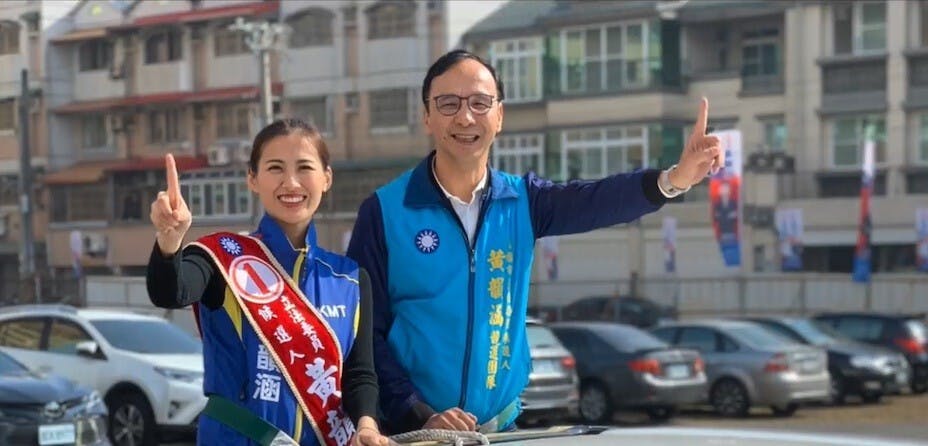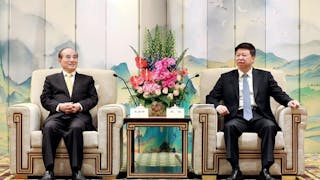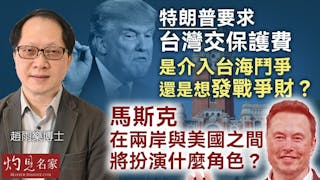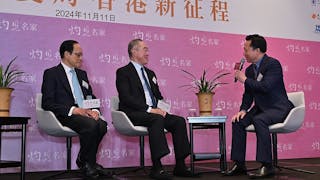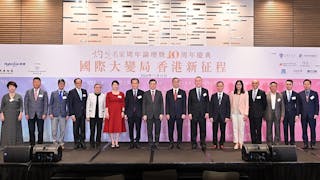國民黨主席選舉將於9月25日登場,新北市前市長朱立倫最近參選國民黨主席的決定,是國民黨換屆的標誌,對2024年國民黨與民進黨爭奪總統大位具有深遠影響。
朱立倫是支持 1992 年「九二共識」的國民黨政治人物。1961 年出生的他,2015 年至 2016年曾擔任國民黨主席,2015年5月,他在北京會晤了中共總書記習近平。如果朱立倫當選國民黨主席,他很可能為台北與北京未來關係的發展帶來重大突破。
重新團結國民黨,政黨合作露曙光
朱立倫說,國民黨過去五年半沒有在美國設立辦事處或派駐代表。他承諾,如果他當選黨主席,他將在美國設立國民黨辦事處和派駐代表──這不啻是對國民黨現任主席江啟臣的間接批評。
然而,江啟臣在 2020 年 3 月當選國民黨主席後,由於新冠疫情在美國的出現和傳播,他並沒有真的有時間訪問美國。 江啟臣與美國在台協會(AIT)前處長酈英傑(William Brent Christensen)討論了幾次。 酈英傑於 2020 年 3 月會晤了江啟臣,算是與國民黨保持了密切接觸。 江啟臣過去也曾到美國講學,會見過不少支持台灣的美國國會議員。江啟臣出生於1972年,在南卡羅來納大學獲得博士學位,熟悉美國情況。
朱立倫宣布競選國民黨主席後,在政治上表現得更加自信。他一直在新竹市等各地拜訪黨內精英,強調他希望在國民黨內部進行改革,而不是進行內部鬥爭。由於民進黨施政的失敗,未能有效防控變種新冠病毒的傳播,該黨聲望正在下降,朱立倫則描繪了國民黨重新團結的願景。
朱立倫說,他想為國民黨建立一支強大的團隊,提名2024年總統大選的最佳候選人,他則不會是候選人;朱立倫誓言要團結國民黨,並補充說,強大的國民黨將是商討與任何政黨結盟可能性的先決條件──這表明他對與2019年8月由台北市長柯文哲領導和創立的民眾黨合作的可能性,採取了開放的態度。
據報道,1959年出生的柯文哲考慮過參加 2020 年的上屆總統大選,但最終沒有這樣做。如果柯文哲懷有競選總統的雄心,那麼2024年的大選對他來說時機已經成熟,因為屆時他將年滿65歲。柯文哲對台灣選民很有吸引力,尤其是他投射出既不支持綠營也不支持藍營的形象。如果柯文哲參加2024年總統大選,他很可能成為「造王者」,因為他的選票將決定國民黨候選人或民進黨候選人能否會贏得總統大位。
藍營立場不統一,總統大位成焦點
朱立倫宣布有意競選黨主席後,國民黨副秘書長顏寬恒決定辭職以保持中立。朱立倫和顏寬恒是好朋友。顏寬恒似乎要避免站在與朱立倫或江啟臣的對立面。面對傳媒關於顏寬恒辭職的提問,江啟臣得體地回答,顏寬恒和他是好朋友,顏寬恒曾支持他在2021年2月競選黨主席的決定。另一方面,顏寬恒表示,他會回到家鄉,幫助鄉親解決從缺電到缺水,從台灣經濟衰退到疫苗不足的各種問題。
朱立倫提出國民黨改革的幾個問題:一、失去了國際支持;二、失去了台灣與大陸溝通的渠道;三、失去了廣泛的支持;四、失去了公眾的熱情 ,以及五、國民黨支持者歷史使命的消失。朱立倫強調「九二共識」對拉近海峽兩岸關係的重要作用,但這種強調很容易被綠營或親民進黨人士批評為對大陸「叩頭」的政策。
朱立倫表示他將在2021年底前訪問美國,而江啟臣則表示他將在10月訪美。 2020年,江啟臣接到美方邀請出席美台國防工業會議,但由於新冠疫情,會議只能通過視像舉行。江啟臣致辭時表示,台灣應該「建構堅強的國防實力」,主張用軍事力量換取和平,並呼籲美國遏制中國任何以武力解決台灣問題的意圖。
江啟臣還強調,台灣應該保護自己的利益,站在美國一邊。在意識形態上,與傳統上保持藍營立場的朱立倫不同,江啟臣似乎是「淺藍」的,稍微向泛綠方面的本土支持者傾斜。
朱立倫確實對民進黨和泛綠陣營構成威脅。他甫宣布競選黨主席,便遭到民進黨支持者的嚴厲批評,質疑他的體育政策會否回到馬英九時期,他主張體育署升格為「 運動發展部」,但馬英九當總統時,體委會「降格」為體育署。朱立倫否認他的政策會回到馬英九時期,相反,台灣的體育發展必須將全民公共衛生作為優先選項。
江啟臣被傳媒問及2024年的計劃時,表示無意競選總統。 但是,他想成為國民黨的「造王者」。 高雄市前市長、2020年初落選的國民黨總統候選人韓國瑜,被一些台灣評論人士視為可能得到江啟臣支持的總統候選人。不過,韓國瑜在2020年6月被罷免高雄市長後,在公開場合淡化了政治活動。嚴格來說,從戰略上講,韓國瑜本不應參加2020年的總統選舉。韓國瑜的失敗表明,他在2024年重返總統大選戰場的機會微乎其微。
藍綠陣營候選人,成兩岸和平關鍵
面對朱立倫的挑戰,江啟臣聲稱,他接手領導國民黨時,該黨的支持率只有12%。現在國民黨的受歡迎程度達到了 23%──比民進黨高 3 個百分點。民進黨的公眾形象最近因未能有效防控變種新冠病毒的傳播而備受批評。
台灣有評論人士推測,朱立倫或許會支持愈來愈受歡迎的新北市長侯友宜,他出生於1957年,到2024年將屆67歲。如果侯友宜在2024年不參加總統候選人提名戰,2024 年之後他就太老了。 作為 2006 年至 2008 年的警政署前署長,侯友宜在新北市防疫享有良好的聲譽。2023年國民黨總統候選人提名戰中的另一匹黑馬,很可能是現任台中市長盧秀燕,她在2018年台中市長選舉中輕鬆擊敗民進黨候選人林佳龍。
一些評論人士藉7月13日公布的最新民意調查,強調侯友宜愈來愈受歡迎,受訪者的滿意率為76.7%,其次是衛生福利部長陳時中(66.8%) 、行政院長蘇貞昌(38.8%)、蘇貞昌的女兒兼民進黨籍律師蘇巧慧(21.2%),以及韓國瑜(18.4%)。
在民進黨方面,副總統賴清德和桃園市市長鄭文燦似乎是2023年民進黨提名總統候選人的最大競爭者。1967年出生的鄭文燦,2014年擊敗國民黨的吳志揚(國民黨大老吳伯雄之子)成為桃園市市長 。 如果賴清德和鄭文燦角逐總統提名,民進黨便很可能會嚴重分裂。
最近的民調顯示,鄭文燦的支持率達 58%;賴清德的支持率更達 58.7% ──這表明兩人是到 2023 年角逐總統候選人的最強候選人。國民黨的朱立倫獲得53.5%的公眾支持度──民調表明他將無法與民進黨的賴清德或鄭文燦競爭。因此,朱立倫必須在國民黨內尋找更具領袖魅力的候選人。畢竟,他沒有再次參選總統的野心。至於台北市長柯文哲只獲得45.9%的,顯示柯文哲的支持度比民進黨的賴清德、鄭文燦和國民黨的侯友宜弱。
布魯金斯學會研究員、AIT前處長卜睿哲(Richard Bush)最近表示,如果「馬英九的複製人」2024年當選台灣總統,那麼大陸與台灣的關係將出現向好的轉折。然而,侯友宜或其他國民黨候選人會在2024年採取與馬英九相同的政治綱領嗎?現在談論為時尚早。
總而言之,國民黨正在經歷改革、更新和競爭。如果朱立倫贏得國民黨主席職位,台北和北京關係的新時代可能會突如其來打開一扇機會之窗,尤其是在2024年,國民黨總統候選人可能來自藍營。如果江啟臣連任國民黨主席,北京可能會更難提出一個對台灣民眾更具吸引力的一國兩制模式。
如果民進黨在 2024 年繼續贏得總統大位,北京與台北的關係將繼續緊張和動盪,除非北京有可以接受的中間人,特別是藍營成員,努力改善雙邊關係。未來幾年,政治不確定性將繼續籠罩着北京與台北的關係,但國民黨黨主席選舉是首場考驗,它將直接影響短期內如何建構兩岸關係。
Kuomintang’s political renewal in Taiwan: Toward the 2024 showdown
The most recent decision by Eric Chu Li-luan to run for the election of the Kuomintang (KMT) chairperson is an indication of the KMT renewal with profound implications for the battle between the KMT and the Democratic Progressive Party (DPP) in the 2024 presidential election in Taiwan.
Born in 1961 and elected as the KMT chair from 2015 to 2016, Chu is a KMT politician supportive of the 1992 consensus. In May 2015, he met Xi Jinping, the General Secretary of the Communist Party of China (CPC), in Beijing. If Chu were elected as the KMT chair, he would likely become a potentially significant breakthrough in the future development of Taipei-Beijing relations.
Eric Chu said that the KMT had not yet established its office and representative in the US in the past five and half years. He promises that, if he were elected as the party chair, he would set up the KMT office and representative in the US – an indirect criticism of Johnny Chiang Chi-chen, the current KMT chair.
However, after Chiang’s election as the KMT chair in March 2020, he did not really have the time to visit the US due to the emergence and spread of Covid-19 in the US. Chiang had several discussions with the former Director of the American Institute in Taiwan (AIT), William Brent Christensen. Brent in March 2020 had visited Chiang to maintain close bilateral contacts. Chiang in the past also went to the US to deliver lectures, meeting quite some Congressmen who were supportive of Taiwan. Born in 1972, Chiang acquired his PhD from the University of South Carolina and is familiar with US circumstances.
Eric Chu has become politically assertive after his announcement to run for the party chair position. He has been visiting party elites in various places, such as Hsinchu city, emphasizing that he wants to introduce reforms within the KMT rather than having internal struggles. He projects an image of reuniting the KMT at a time when the DPP popularity is in decline due to the ruling party’s clumsiness and failure to tackle the spread of Covid-19 variants effectively.
Chu says that he wants to build up a strong team for the KMT to nominate the best candidate for the 2024 presidential election. Nor would he be the candidate. Chu vows to bring solidarity back to the KMT, adding that a strong KMT would be a precondition of discussing the possibility of coalition with any other political party – an indication that he adopts an open-minded attitude toward cooperation with perhaps the People’s Party, which was led and founded by Taipei mayor Ko Wen-je in August 2019.
Born in 1959, Ko was reportedly toying with an idea of running for the last presidential election in 2020, but he eventually did not do so. If Ko harbors the ambition to run for the presidential election, the 2024 election would be ripe for him to consider because he will be 65 years old by that time. Ko has its appeal to Taiwan voters, especially as he projects an image of neither pro-green nor pro-blue. If Ko runs in the 2024 presidential election, he would likely be a “kingmaker” because his votes would determine whether the KMT candidate or DPP candidate would win the electoral showdown.
After Chu announced his intention to run for the party chair position, a deputy secretary of the KMT, Yen Kuan-heng, resigned to maintain neutrality. Eric Chu and Yen are good friends. Yen appears to avoid antagonizing either Chu or Chiang. In response to media questions on Yen’s resignation, Johnny Chiang answered gracefully that Yen and he are good friends, and that Yen had supported his decision in February 2021 to run for the party chair position. On the other hand, Yen said that he would return to the grassroots level to help constituents to fight for various issues, ranging from the lack of electricity to the absence of water supply, and from Taiwan’s economic decline to the inadequacy of vaccines.
Eric Chu raises a few issues to reform the KMT: (1) the loss of international support, (2) the loss of channels between Taiwan and the mainland, (3) the loss of popular support, (4) the loss of public enthusiasm, and (5) the loss of historical mission among KMT supporters. Chu’s emphasis on the utility of the 1992 consensus is important to the closer relations between the two Straits, but such an emphasis can be easily criticized by the green camp or the pro-DPP side as a “compliant” policy toward the People’s Republic of China (PRC).
Eric Chu remarked that he would visit the US by the end of 2021, while Johnny Chiang remarked that he would visit the US in October. In 2020, Chiang received an invitation from the US-Taiwan Defense Industry Conference to interact with the US side, but due to Covid-19, the conference was held through the video. Chiang delivered a speech saying that Taiwan should enhance its military reserve’s capability of fighting any war. He advocated an approach of using military strengths to exchange for peace and appealed to the US to rein in any PRC intention of solving the Taiwan question by force. Chiang also stressed that Taiwan should protect its own interests and side with the US. Ideologically, unlike Eric Chu who maintains a traditionally blue position, Chiang appears to be light blue, slightly tilting toward the local supporters of the pan-green side.
Eric Chu does constitute a threat to the DPP and the pan-green camp. Once Chu announced his intention to run for the party chair, he has been severely criticized by DPP supporters, who quickly questioned whether his sports policy would return to the Ma Ying-jeou era in which the sports development committee was “downgraded” into sports development department. Chu denied that his policy would represent a return to the Ma era, but instead sports development must consider the public health of all citizens as a priority.
When asked by the media about his plan in 2024, Johnny Chiang said that he has no intention of running for the presidential election. However, he would like to be a “kingmaker” in the KMT. Han Kuo-yu, the former Kaohsiung mayor and formerly defeated KMT presidential candidate in early 2020, is regarded by some Taiwan commentators as a possible presidential candidate to be supported by Chiang. However, Han has toned down his political activities in public after he was successfully impeached and removed from the mayor position in Kaohsiung in June 2020. Strictly and strategically speaking, Han should not have participated in the 2020 presidential election. His defeat signaled that Han’s chance of returning to the presidential election battle in 2024 would be slim.
In face of the challenge from Chu, Chiang claimed that, when he took over the KMT leadership, the party’s popularity was only 12 percent. Now its popularity reaches 23 percent – 3 points higher than the DPP whose public image is plagued by its failure to tackle the recent eruption and spread of Covid-19 variants effectively.
Some commentators in Taiwan speculate that Eric Chu would perhaps support the increasingly popular New Taipei mayor Hou Yu-ih, who was born in 1957 and who will be 67 by 2024. If Hou would not run for the presidential nomination battle in 2024, he would be too old to do it after 2024. As a former director of the National Police Agency from 2006 to 2008, Hou is enjoying a good reputation of maintaining law and order in the city of New Taipei, where Covid-19 has been under control. Another dark horse in the 2023 KMT presidential nomination will likely be the current Taichung mayor Lu Shiow-yen, who defeated DPP candidate Lin Chia-lung comfortably in the 2018 Taichung city mayoral election.
Some commentators have used the most recent opinion survey released on July 13 to emphasize the increasing popularity of Hou Yu-ih, who got 76.7 percent of the satisfaction rate from respondents, followed by Minister of Health and Welfare Chen Shih-chung (66.8 percent), Premier Su Tseng-chang (38.8 percent), Su’s daughter and DPP lawyer Su Chiao-hui (21.2 percent), and Han Kuo-yu (18.4 percent).
On the DPP side, vice-president William Lai Ching-te and Taoyuan mayor Cheng Wen-tsan appear to be the top contenders for the presidential nominee of the ruling party in 2023. Born in 1967, Cheng became the mayor of Taoyuan by defeating John Wu of the KMT in the hotly contested 2014 Taoyuan mayor election. It will be likely that the DPP would be seriously divided if Lai and Cheng would compete for the presidential nomination.
Recent public opinion polls have pointed to 58 percent support for Cheng and 58.7 support for Lai – an indication that the two are the strongest candidates competing for the presidential nominee position by 2023. Eric Chu of the KMT got 53.5 percent of public trust – a result indicating he would not be able to compete with Lai or Cheng from the DPP. As such, Chu would have to find a more charismatic candidate within the KMT. After all, he does not have the ambition to run in the presidential election again. Taipei mayor Ko Wen-je only got 45.9 percent of the public trust – showing that Ko is weaker compared with the DPP’s Lai and Cheng and KMT’s Hou Yu-ih.
Richard Bush, a researcher from Brookings Institution and a former AIT Director, has recently said that, if “a clone of Ma Ying-jeou” would be elected as Taiwan’s president in 2024, then the mainland-Taipei relations would take a turn for the better. However, it remains too early to say whether Hou Yu-ih or any other KMT candidate would adopt a political platform which would be the same as Ma Ying-jeou in 2024.
In conclusion, the KMT is undergoing reforms, renewal and rivalry. If the KMT chair position is going to be captured by Eric Chu, a window of opportunity would likely be suddenly opened for a new era of relationships between Taipei and Beijing, especially in 2024 when the KMT presidential candidate would likely be from the blue camp. If the KMT chair position is going to be captured by Johnny Chiang, Beijing would likely be more hard-pressed to come up with a more attractive model of “one country, two systems” to the people of Taiwan. If the DPP would continue to capture the presidential position in early 2024, Beijing-Taipei relations would remain tense and rocky, unless intermediaries acceptable to Beijing, notably members of the blue camp, would work very hard to ameliorate the bilateral relations. Political uncertainties continue to cloud Beijing-Taipei relations in the years to come, but the party chair position of the KMT will be the first test with the immediate implication of shaping the cross-Strait relations in the short run.
原刊於澳門新聞通訊社(MNA)網站,本社獲作者授權轉載。



